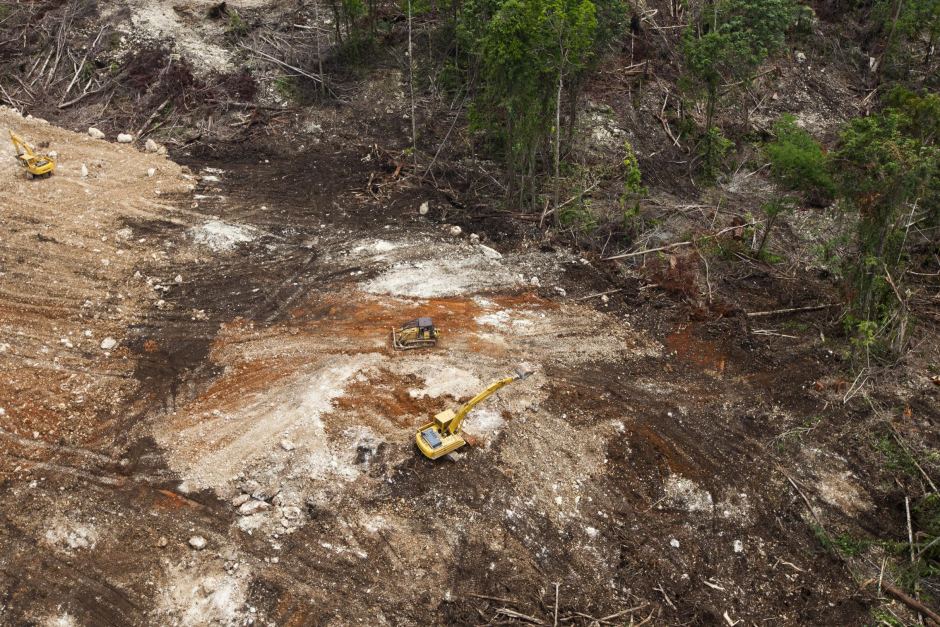Millions of hectares of customary land in Papua New Guinea has been stolen as a result of agricultural and business leases approved by the government, a report by Greenpeace has found.
The report, titled Up For Grabs, is a detailed analysis of evidence presented to the PNG government's commission of inquiry into how more than five million hectares of land was lost to Special Agricultural and Business Leases, often without the permission of landowners.
The commission has finished its report but it won't be made public until it is tabled in parliament by the newly-elected government.

The report's author, Paul Winn, says the commission was told of a "litany" of problems.
"The land investigation process, which was supposed to be undertaken by the department of Lands and Physical Planning, was botched at every step of the way," he said.
"In some instances, the so-called developer company, who gained access to these sub-leases, actually paid the public servants to do their job and in some cases actually overtook the process altogether."
Australian interests
About 11 per cent of PNG's landmass is subject to the leases, and 75 per cent of the leases are foreign owned.
Australian and Malaysian logging companies are some of the biggest beneficiaries.
"In one case... an Australian company, Independent Timber and Stevedoring, has control of two million hectares - the largest single area [leased] in Western Province," Mr Winn said.
"They actually undertook the [leasing] process themselves, at every step of the way they manipulated the whole process.
"They now have most of the government approvals necessary to log 600,000 hectares of forest, which would be the largest logging operation in PNG's history."
Rich environment
Special Agricultural and Business Leases allow clear felling of forests, whereas logging concessions require less damaging selective harvesting.
Greenpeace says leases have been granted for some of PNG's most pristine environments and take in 130,000 hectares of protected areas.
James Cook University Professor William Laurance says the logging is threatening tropical protected areas.
He says Papua New Guinea has some of the richest and most varied biological real estate on the globe.
"What it means if you effectively nuke an area, which is what can happen with some of these Special Agricultural and Business Leases, you can have very serious impacts," said Professor Laurance.
"In some cases you can completely wipe out an entire species.
"The Association for Tropical Biology and Conservation ... has already had a major international resolution on this issue, so that is really an indicator of the kind of level of international concern that is being focused on this already."
No permission
Special Agricultural and Business Leases are not supposed to be granted without the permission of landowners.
However, Norbett Pames says his land in the East New Britain Province was cleared two years ago, without his permission.
"When they start clearing the forest... the effect on our environment and the effect on our water, now it is hard for people to get water," Mr Pames said.
"Also, there are other social problems happening in the affected area, people are drinking and fighting, ladies are having unexpected pregnancies.
"They used to make gardens and survive on the land, now it is very hard because all the land is taken up by the logging operations."
Take action
Paul Winn has called on PNG's new government to legislate to nullify leases that don't have the consent of landowners.
"What we would also like to see ... is legislation introduced that overturns and nullifies any leases that are found to have significant objections by land owners or are found to have been granted fraudulently."
"There is a great opportunity for Australia to improve its relationship with Papua New Guinea.
"[Australia can help] develop a proper land use plan, where landowners have agreed to areas of their land being used for agricultural development.
"Also, [a plan] where there are opportunities given for those landowners to not only pursue logging and agriculture but to have options apart from those developments, such as tourism."
He says the companies involved should also be blacklisted, and stopped from claiming compensation.
- Klaireh's blog
- Log in to post comments

Comments
Why is Green Peace So Loud on SABL and So Silent on Issues of